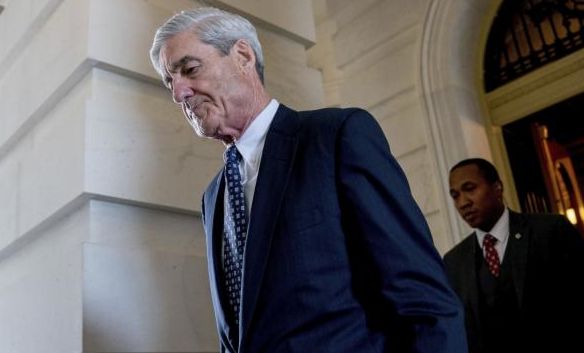Trump team trying to portray fired FBI Director James Comey as unreliable witness
Developments on Day 224 of the Trump Administration:
Trump Lawyers Deny Obstruction of Justice
Donald Trump’s attorneys have repeatedly met Special Counsel Robert Mueller (pictured) over his Trump-Russia investigation, arguing that their client did not obstruct justice when he fired FBI Director James Comey on May 9.
The White House attempted a cover story that Comey was removed because of his handling of the inquiry into Hillary Clinton’s e-mail, but the effort was shredded by Trump’s declaration in a televised interview that he removed Comey because of the examination of possible Trump campaign connections with Russian officials.
On the day after dismissal, Trump boasted to visiting Russian Foreign Minister Sergei Lavrov that he had gotten rid of the “crazy”, “nut job” FBI Director.
Mueller, Comey’s predecessor at the FBI from 2001 to 2013, is reportedly looking into Trump’s behavior both over the Comey affair and over the dictation of his son Donald Jr.’s initial, misleading memorandum about a meeting with Kremlin-linked envoys in June 2016.
Trump’s lawyers submitted a document asserting that there was no merit for an obstruction-of-justice charge because Trump can hire and fire whomever he wishes in the Executive Branch.
Trying to blunt further investigation, the legal team warned Mueller that Comey is an unsuitable witness. The attorneys said in June that Comey is prone to exaggeration and the source of leaks to media.
On Thursday, their arguments were accompanied by a letter from Republican legislators to the new FBI director, Christopher Wray, complaining that Comey had clear Hillary Clinton over her e-mails before the FBI completed its interview of witnesses, including Clinton.
There was no indication from sources that Mueller has been persuaded to drop his inquiry into Trump’s possible obstruction of Justice.
Mueller Bolsters Inquiry with IRS Assistance
Meanwhile, Mueller’s team has enlisted the aid of the Internal Revenue Service in the examination of financial affairs around possible Trump-Russia links.
Mueller’s attorneys have approached the IRS’ Criminal Investigations Unit, whose 2,500 agents focus exclusively on financial crime, including tax evasion and money laundering.
The IRS has access to Donald Trup’s tax returns, which he has refused to release before and after his election, and to those of his associates.
The FBI investigation of Trump-Russia connections has focused on possible Russian financial input, through two Kremlin-linked banks, since summer 2016.
Mueller is also linked his inquiry with that of New York State Attorney Eric Schneiderman, for example, into the financial affairs of former Trump campaign manager Paul Manafort. The initiative could put pressure on Manafort, as Donald Trump’s powers of pardon do not extend to convictions in State judicial systems.

